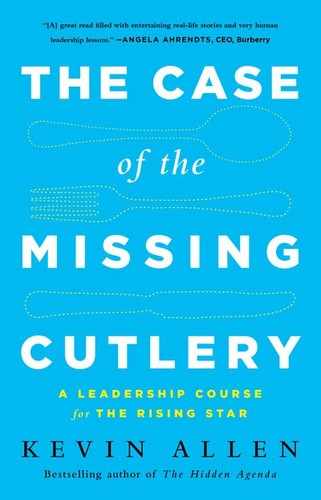Chapter 4
Told You So
It’ll never work. This is ridiculous. Let the big shots figure it out. Why should we care? We’ll get blamed one way or the other anyway,” said Daisy. Tall, formidable, and very outspoken, Daisy was a “catcher”, the person who took clean dishes off the conveyor belt as they came through the wash and dry cycle. She intimidated me a little, but we thankfully got on well. Daisy was a cross between Eeyore and George Patton. The glass, for Daisy, was permanently half empty, and for the first time in my career I saw up close what negativity could do to an organization.
Mr. Fuentes, in contrast, was a man of few words. I am sure his people didn’t know what I knew, that this deeply thoughtful father of six daughters cared and worried deeply for them. Mr. Fuentes was always the first to step forward. He was steady as we huddled together. He never let anyone know that he was anything other than certain we would somehow figure it out. At the same time, Daisy could be heard continuing her mutterings of disagreement, including how “it won’t work, it won’t matter,” and so on. I decided it was time. Late one afternoon, I pulled her aside. “Daisy, my mom used to say that if you don’t have anything nice to say . . . then don’t say it. You know, people will listen to you, Daisy, for good or for bad. It’s really for you to decide.”
I walked off, leaving her to think about Mom’s eternal wisdom.
The day came. The team, and our borrowed friends from the truck maintenance department, were finished with the retooling work. The dish room employees began their task. Rack after rack of cutlery was placed into the awaiting machine while the rest of us clustered at the far end of the forty-foot behemoth, waiting in anticipation for gleaming cutlery to emerge. The steam cleared . . .
The cutlery was still stained.
I was crestfallen. Now what?
At the conclusion of our gathering, which coincided with the end of the shift, Sal, a huge, barrel-chested Brooklynite, slapped me on the back, nearly knocking me down, and said, “Don’t worry, Mr. Delightful, we’ll figure it out.”
Mr. What?
It had slipped out in the most affectionate of ways, but it was abundantly clear that I was known among the staff as “Mr. Delightful.” I later deduced the nickname came from one of my many eccentricities, an arcane use of nineteenth-century language. After a sufficient number of “delightfuls” and “splendids,” the name stuck. At first a bit taken aback, I realized: I was being made buoyant.
While I huddled with the team, looking over the disappointing result, Sal explained the nuances of gears and how other ideas would do the trick. I muttered, a little too loudly, “That’ll fix the little thug.” At that moment the entire assembly looked at me and grinned from ear to ear, clearly in agreement on my opinion of the gentleman from Eastern. It was our little secret, but henceforth the nickname “little thug” became etched in our lexicon. Now, I confess, I am not sure I was right in my choice of words, describing our “beloved” client in this manner, but, well, my working-class roots sprang forth. With those words, I unwittingly identified a powerful unifying external force—a villain, shall we say—that could keep the team focused on the task at hand and determined to “defeat” the forces aligned against them. George, wherever you are, forgive me, but it worked like a dream.
